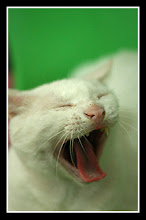There's still a cloud of grief hovering over my home three days after the tragic killing of Leonard Co, a noted botanist and a colleague of my sister Lala at the Institute of Biology, UP Diliman.
I never really knew Sir Leonard on a personal level, but his name has always resounded around the conservation and nature enthusiast circles, and has inevitably reached our household.
Living in the same house as Lala, I have come to know Sir Leonard from second-hand anecdotes told by a fan girl. I knew, for instance, that while he was the acknowledged plant expert at IB, with an almost encyclopedic knowledge of Philippine flora, it wasn't until 2008 that he finally "graduated" from college. The University awarded him an honorary Bachelor's degree--truly hard-earned and well-deserved--in recognition of his significant achievements and contributions to the field of Botany.
I also knew that Sir Leonard and Dr. Dan Lagunzad, another plant expert and a senior Botany professor at IB (who, in an uncanny twist of fate, lost his battle with cancer and passed away the day after his longtime colleague), were always on the lookout for potential plant people they could groom to follow in their footsteps.
Idol Uly
One of those they were eyeing was Ulysses Ferreras, a plant enthusiast who just came to IB one day dragging a sackful of plant specimens he wanted identified. Uly eventually struck up a friendship with Sir Leonard and Sir Dan, and sort of became their disciple and apprentice in the field.
He also became a friend of my family, and had joined several of my sister's field expeditions representing the plant component. He even bacame a member of the bird club at one point, which we had to be discreet about as Sir Leonard was a jealous mentor and didn't want his plant proteges defecting to the bird group.
That Lala looks up to Sir Leonard as a hero/mentor is not something trivial. A wildlife biologist, my sister is all too familiar with the amount of work a field researcher puts into every expedition. From the Babuyan islands to Jolo, Sulu, she had planned and executed some very challenging research expeditions, sometimes with research assistants, at other times by herself with her local guides.
The published articles that such expeditions yield do not give a clue to the long and difficult trails the researchers have to ford, the flooded rivers they have to cross, the wild animals they have to steer clear of, and the most dangerous of all--as Sir Leonard's senseless death has shown--the armies of either side of a long-winding political war that has lost its relevance a long time ago.
Sign of life
When Lala leaves for the field, we all know that it would be weeks before we would hear from her again, often via an MMS image of the wilderness in which she luckily finds a cellular signal. Her messages are our only indicator that she is alive and well. The rest of the time, we could only trust that the One who called her to that profession will also protect her, for as long as she still has a job to do.
When she returns from the field, she goes back to her classroom job in the state university and earns around the same salary as a first-level call center agent. No HMO coverage, no insurance benefits--she has to pay for those herself.
This is the cost of doing science in the Philippines. It is no wonder that not many people, even among graduates of the state university, are willing to do it. The price is just too steep. Very few people have the courage and grit to take on the challenge, and that the best of them had to be martyred is just sad.
Subscribe to:
Post Comments (Atom)



No comments:
Post a Comment